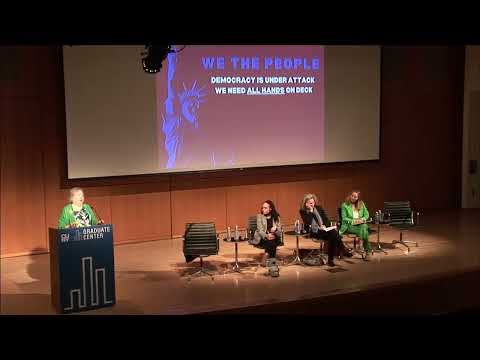
June 2010 Community Bulletin
Liz Krueger
August 10, 2010
-
ISSUE:
- Constituents Corner
What's Inside
MESSAGE FROM LIZ
COMMUNITY SPOTLIGHT
- East Side DHCR Day
- Fighting Reductions to Bus Service in East Midtown
- Construction Begins on P.S. 59
- Tenant Education Seminar on Roommates
- Free Career Workshops for Women
- Share Your Skills and Get Help from Others with TimeBanksNYC
SENIOR SPOTLIGHT
POLICY SPOTLIGHT
- Charter Schools
- Questions Hour
Message from Liz . . .
First an update on Education Reform and Charter Schools: On May 28th, I voted for a package of legislation which will improve New York State’s public education system by using student improvement as a factor in teacher evaluation; increase our chances of receiving Federal “Race to the Top” education funds and increase the cap on the number of Charter Schools and their accountability, including Comptroller audits and forbidding for-profit charter schools. I did so because these bills addressed my main concerns, which I outlined in last month’s newsletter: that I felt plagued by the one-house version the Senate had passed on May 3rd, which I voted against. A detailed description of the improvements in the final bills is included in the Policy Spotlight below.
In the end, we were able to bring all the players to the table and as a result I believe that the Legislature passed a much better package of education reform bills. The new bills recognize both the value of charter schools when they are correctly run, as well as the need to ensure they are subject to appropriate oversight, are not allowed to cream the least hard-to-serve from existing public schools, and provide for a better community process before any school is approved.
In other Albany business, earlier this month the Senate passed my bill (S.3584-B) authorizing New York City and other localities to utilize Instant Runoff Voting (IRV) in local elections. IRV would provide greater opportunities for voters to express their preferences while at the same time reducing costs for elections. This measure could be of particular importance if the voters of New York City move to a nonpartisan election system, as is currently being considered by Mayor Bloomberg’s Charter Revision Commission.
Given our current fiscal crisis, one reason IRV can be so crucial is because it negates the need for separate primary runoffs, which are tremendously expensive. Last year, New York City spent $15 million to hold a Democratic primary runoff election for Comptroller and Public Advocate. Not only was this costly, it was also antidemocratic, since less than eight percent of eligible voters participated. There has to be a better model for running our elections.
Instant Runoff Voting would allow voters to indicate their top choices of candidates for an office by ranking them first, second, third, etc. If no candidate receives 50 percent of the first choice votes, then the candidate receiving the fewest votes is eliminated, and the second choices of voters are counted. This process is continued until a candidate receives 50 percent of the vote. This eliminates the need for separate runoff elections while still ensuring that a marginal candidate does not win with a very small percentage of the vote in a race with many candidates.
This later factor will become particularly important if we move to nonpartisan elections. Because of the cost factor, there is no runoff system for City Council races, only citywide races. In a nonpartisan citywide election, all candidates could appear on one ballot. So, for example, if there were 10 candidates for Mayor, a candidate who received just a small percentage of the vote could win. This opens up the possibility for extremist candidates, or candidates whose views are very different from the majority of voters in the City, to win an election.
This is one reason nonpartisan voting has always been controversial in New York City – it could allow a minority party’s candidate to win if the majority party’s multi-candidates split the vote too broadly. But it could also allow someone with a small but united base to defeat a slew of mainstream candidates. I don’t support New York City adopting a nonpartisan system, but if it does, it will be even more important to adopt instant runoff voting to increase the responsiveness of that system to the will of the voters.
----
COMMUNITY SPOTLIGHT
Fighting Reductions to Bus Service in East Midtown:
I have been working with other elected officials to pressure the MTA to modify its plans to reduce or eliminate service on several bus lines which serve Turtle Bay, Sutton Place, and other East Midtown neighborhoods. Currently, the MTA plans to eliminate: the M27, the weekend and evening service on the M50, and the cross-town service from times Square to the UN on the M104. However, last Friday the MTA announced something for us to celebrate: the 49th/50th Street stop was restored to the Select Bus Service route. This is a huge first step toward restoring the slated cuts to this neighborhood. I, along with colleagues, will continue to work with the MTA to protect this community's transportation lifelines.
Construction Begins on P.S. 59:
On May 21st, I joined NYC Schools Chancellor Joel Klein, other elected officials and community members in breaking ground on a brand new mixed-use development which will house two public schools. Located at 250 East 57th Street, the $500 million development will house new, modern facilities for P.S. 59 and the High School of Art and Design, which will open to students in September of 2012. Construction of the schools will be paid for by private developers as part of a partnership with the Department of Education’s Educational Construction Fund (ECF), which develops mixed-use real estate projects featuring new school facilities. The 57th Street complex is the largest ECF project to date.
The new P.S. 59 will be expanded to accommodate 730 students, up from 500 students now, and the High School of Art and Design will accommodate 1,400 students. As designed, P.S. 59 and the High School of Art and Design will frame an expanded open space, providing children with a safe, controlled environment for recreational activities. A new side yard setback along 56th Street will create additional outdoor play areas for the schools. Along with the two schools and a residential tower, Whole Foods will lease space on the property.
The development of P.S. 59 is a win-win situation for students, parents, and the community. Not only are we creating a state-of-the-art school in a community which desperately needs new seats, but we are doing so at minimal cost to the City of New York. This goes to show how rewarding a good-faith partnership between the City and the private sector can be, and I hope we continue to maximize these mutually beneficial opportunities.
Tenant Education Seminar on Roommates:
On June 23rd, Eviction Intervention Services (EIS) is offering a seminar entitled “Problem: Rent, Solution: Roommates.” Topics will include:
• Learning How to Protect Yourself; whether you’re the lease holder or the prospective sharer
• Safeguards and Agreements which will help make successful matches
• Criteria for apartment sharing from Home Share Experts
Questions will be answered by a panel of experts including the Hon. Michelle Schreiber, Housing Court Judge, Paul David Kushner, Esq., EIS Lead Attorney, Janice Meredith from the Home Sharing-Foundation for Seniors, and Sophia Biraglia, Managing Agent, Bettina Equities. The event takes place at EIS Headquarters, 1233 2nd Avenue, 3rd Floor, between 64th and 65th Streets. Light refreshments will be served at 6:00; program begins promptly at 6:30.
Free Career Workshop for Women:
The Department of Labor Women’s Bureau is sponsoring a four session workshop series on exploring new career options to support women in their job search. The workshop will take place on June 7, 9, 14 and 16 from 9:00 to 11:00 AM at P.S. 84, 32 West 92nd Street (bet. Columbus Ave. & Central Park West). Workshops are facilitated by Constance Gemson, Career Coach, College Instructor, Writer, and Social Worker. Refreshments will be served. Participants must be committed to attend all 4 sessions. Register online at http://www.parentjobnet.org/womens-career-workshop.aspx or call (917) 546-9104.
Share Your Skills and Get Help from Others with TimeBanksNYC:
TimeBanksNYC is a free network of people exchanging their talents and skills for personal improvement and the good of the community. Service exchange categories are wide ranging, including arts, business services, computer technology, home repair, transportation, and many others. For each hour a member spends sharing a skill with a fellow member, she or he earns a one-time credit that can be redeemed from someone else on the network. For more information or to join, visit call (866) 244-6469 or visit www.nyc.gov/timebanksnyc.
---
SENIOR SPOTLIGHT
Do you know an extraordinary Senior Citizen? Someone who has gone above and beyond to help enhance their community or a local organization? If so, he/she may be a perfect candidate for the Senior Spotlight Award, Senator Krueger’s new program to honor local Seniors whose presence light-up the community.
To nominate a special senior please visit Senator Krueger’s website http://www.nysenate.gov/senator/liz-krueger, starting next week (6/14).
Our first Senior Spotlight Shines on Lou Stallman. Lou Stallman is a special Upper East Side senior who has recorded over five hundred songs, including “Treasure of Love,” “Round and Round,” “It’s Gonna Take a Miracle” and the New York Yankees official theme song. Lou is very active in the community and attends many senior and community events. In addition he has mentored a number of young artists including Jerry Potente with whom he is currently working on a cartoon project called CARHEADS™. He is also currently working on writing the script for a full length animated film. We are honoring Mr. Stallman for his commitment to the arts and his community.
----
POLICY SPOTLIGHT
Charter Schools
Here is an outline of some of the key differences between the one house Senate bill I voted against on May 3rd and the revised legislation passed May 28th:
For-profit Charters: The original bill permitted new for-profit charters. The final version bans any new for-profits, while allowing existing for-profits to continue to operate.
Oversight: The bill I voted against did not include adequate oversight to ensure charters be financially and educationally sound. The final version included a number of important oversight and accountability measures:
• Authorization of a State Comptroller audit;
• Increased oversight of charter schools applies to their financial, operational and management programs, including the disclosure of conflicts of interest and the conducting and publicizing of monthly board of trustee meetings;
• Requires the enrollment lottery process to comply with the open meetings law and the submission of a uniform application created by the Commissioner in the predominant language in the community in which the charter is located; and
• Charter schools would be subject to State Education Department (SED) approval and required to meet SED health and safety requirements to the same extent as public schools.
Co-Location: The original bill did not address the issue of co-location in over-crowded school buildings, which has resulted in pitting parent against parent in NYC’s school system. The final version strengthens protections for existing schools with a number of provisions:
• Before co-location is permitted in a public school building, the Chancellor is required to provide notice and identify buildings where any charter may be co-located, including the rationale for the co-location selection;
• After co-location is selected, the Chancellor must develop a publicly-available building usage plan comprised of the actual allocation and sharing of classroom and administrative space; a proposal for the collaborative usage of shared resources; a justification of how the shared usage is equitable to both the charter and public schools in the building; and safety and security information;
• Requires the creation of a shared-space committee consisting of the principals, teacher representatives, and parents of both the public and charter schools; and
• Any capital improvement or facility upgrade to a co-located charter school in excess of $5,000 requires a matching capital improvement or facility upgrade in the non-charter public school.
Special needs students: The original legislation allowed for the potential to “warehouse” special needs children at a separate site from the main charter school, and would have allowed multiple charters to serve special needs children in some shared location far away from their communities. The new bill would not allow these practices, and also includes much stronger language to ensure charters are serving comparable numbers of special needs students to surrounding public schools, by making recruitment of special needs students one of the criteria for charter renewal.
Questions Hour
I have joined Assemblymember Micah Z. Kellner in introducing legislation to create a Governor’s Questions Hour, opening up debates over the direction of the State to public scrutiny. The bill would require the Governor to stand before the Legislature for an hour each month during the legislative session to answer questions from Senators and Assemblymembers, in a televised interaction similar to the British tradition of Prime Minister’s Questions.
A Governor’s Questions Hour would help break the logjam in Albany’s political process, giving New Yorkers direct access to the discussions which shape the State’s policies. By pushing political debates out into the open, it will create a remedy to the backroom dealings and bickering for which New York’s State Government has become notorious.
Every once in a while I have time to watch the British Prime Minister answer questions from Parliament on the BBC channel and am struck by how much information about government is revealed through this back-and-forth. Wouldn't it be great to have this type of public, open dialogue between the Governor and NY State's two 'houses of Parliament'? Since these sessions would be available for TV and live webcast, we just need to have some better rules than the British about what types of fruit can and cannot be thrown. As I recall, they favor tomatoes.
The bill will give Legislators an opportunity to question the Governor about the strategic direction, financial status, and general governance of the State. It will require the Governor to stand before the Assembly and the Senate on alternating months during the legislative session, responding to inquiries from Republicans and Democrats alike. The bill specifies that the percentage of time allotted for questions from members of the majority and minority parties will be based on the percentage of representation of each party.
Share this Article or Press Release
Newsroom
Go to NewsroomWe The People: Taking Action to Save Democracy
April 24, 2025


Legislature Passes Bill Banning New For-Profit Hospices
April 9, 2025
